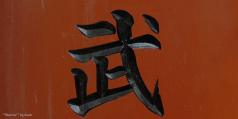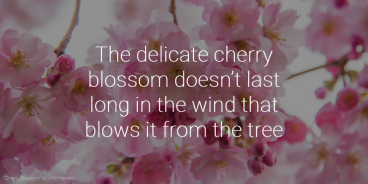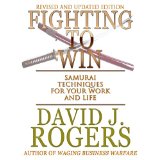My thirty-seven year old son, a school principal and YA author, and a wonderful man, has been a strong supporter of my work since he was a little boy and went with me to store after store while I autographed books. It’s he who suggested I write a blog. That’s when I said, “A what?” So three years ago that’s what, with my wife’s technical help, I started to do. I hope my blog friends are reading this post and will benefit from it. A few years ago my son called me and said, “Dad, in an internet reader’s poll Fighting To Win has been maned the best motivational book ever written.” I said, “Well, how do you like that?” Any creator knows what a joy it is to have his/her work praised. (That’s one reason we work so hard isn’t it?)
 And any author knows that if he writes a book that catches on, he’ll never get rid of it. He will become identified with it the rest of his life. So here I am, the author of Fighting to Win: Samurai Techniques for Your Work and Life. I’m happy to say that that prescriptive how-to-do-it self-improvement book is a classic that since it first came out thirty years ago has been widely used by people of all kinds here and in Europe and Asia as a guide to actualizing their wonderful talents that otherwise may have lain dormant and unused. It started as a book popular with people in the work world, particularly business people, but then quickly spread to people in the arts.
And any author knows that if he writes a book that catches on, he’ll never get rid of it. He will become identified with it the rest of his life. So here I am, the author of Fighting to Win: Samurai Techniques for Your Work and Life. I’m happy to say that that prescriptive how-to-do-it self-improvement book is a classic that since it first came out thirty years ago has been widely used by people of all kinds here and in Europe and Asia as a guide to actualizing their wonderful talents that otherwise may have lain dormant and unused. It started as a book popular with people in the work world, particularly business people, but then quickly spread to people in the arts.
Over the years I’ve received thank-yous from accountants and sales people, and painters, writers, opera singers, composers, movie directors, actors, musicians, and so on–people who’ve come to realize that whatever their walk of life might be, the psychology of the warrior fits them to a T because they are thinly disguised warriors too. It’s a tribute to Fighting to Win that it Is still available as an eBook, is still being read, and is still changing lives.
I turned to the study of the samurai way of life as a result of hard times taking a terrible toll on me. I experienced far too many disappointments and was cheated in business by people I had trusted. I was looking for something that would  salvage me from the kind of misery I was experiencing and in the samurai Way found strength as well as insights, strategies, and techniques I could use to pull myself out of the awful lethargy I had settled into. By way of the book, magazine articles, TV and radio, the internet, and speeches, I’ve been fortunate to meet many wonderful people. They have told me that they too have found solace from setbacks and gained the psychological and spiritual wherewithal to excel in their careers through samurai wisdom and what I call “the inner skills of creative people.”
salvage me from the kind of misery I was experiencing and in the samurai Way found strength as well as insights, strategies, and techniques I could use to pull myself out of the awful lethargy I had settled into. By way of the book, magazine articles, TV and radio, the internet, and speeches, I’ve been fortunate to meet many wonderful people. They have told me that they too have found solace from setbacks and gained the psychological and spiritual wherewithal to excel in their careers through samurai wisdom and what I call “the inner skills of creative people.”
The samurai of Japan were the greatest warriors who ever walked the earth. Trained to perform phenomenal feats of courage and fearlessness, they were stern, quiet, utterly serious people who devoted their lives to developing their skills, spirits, and minds to the highest possible level.
Just as all creative people face internal obstacles that interfere with their lives, so did the samurai. The bulk of his or her training (there were women samurai) was devoted to overcoming those inner obstacles that are no different than the obstacles you and I and creators of all descriptions face—anxiety, procrastination, self-doubt, hesitation, fear of taking risks, nervousness, discouragement, crippling over-analysis, depression, apprehension, impatience, anger, and more.

Japanese Character for Warrior
Creators and warriors both begin as ordinary people with the potential to be exceptional and memorable, to apply themselves and acquire impressive skills not everyone possesses, and to develop talents and excel at their chosen life path–their “Way.” Each Way is different: the Way of the painter is similar to yet totally different from the Way of the actor, which is like but different from the Way of the writer or the ballet dancer, etc. At a certain point in their training and development, they cease being ordinary anymore, but have become extraordinary. They have wholly recreated themselves.
To function superbly in their chosen role–the painter to paint, the writer to write, the performer to perform, the samurai to fight–of necessity all must be brave, be bold, take chances, and resist discouragement, fear, hesitations, and self-doubt. Ideal warrior creators have the courage of a lion, the boldness of a gambler, and yet the sensitivity of a butterfly. Critics and nay-sayers are not capable of intimidating them–nothing does. Think how liberating it is to be incapable of being bullied by agents, by publishers, by directors. They are not flustered. Now you are thinking how glorious that would be. When they are facing critical moments, their goal is to be as relaxed as a person sitting down for breakfast, and that’s possible.
I’m sure you know many creators who encounter the fear of performing their craft–that’s one of their fears. When I  visited a successful painter friend of mine I saw the same unfinished painting on the easel. Nothing about it changed month after month. Not a single new brush stroke touched the canvas. Then she moved away and I didn’t see her for a number of years. When we got together again I asked first thing since that was what I was the most curious about: “Whatever happened to that green pastel that was on your easel for so long?”
visited a successful painter friend of mine I saw the same unfinished painting on the easel. Nothing about it changed month after month. Not a single new brush stroke touched the canvas. Then she moved away and I didn’t see her for a number of years. When we got together again I asked first thing since that was what I was the most curious about: “Whatever happened to that green pastel that was on your easel for so long?”
She said, “I never finished it.”
I said, “You were afraid.”
She said, “I was terrified of it.”
I know a singer who has had a successful professional career, but suddenly and inexplicably after five years developed a fear of performing and for two years retired because of it. She read the book, applied what she read, resumed her career, and was more successful than ever. Her ordeal of not being able to perform matured her.
Fear–there are a thousand of them–is the creator’s most formidable foe. You know that: fear of not being good enough or creative enough or smart enough or talented enough, of being rejected by an audience, of never reaching the success you dreamed of since childhood.
Some creators are afraid even to enter their work room in the morning. The creator’s fear tightens him/her up. Confidence disappears and self-punishing self-doubt takes its place. Their thoughts don’t flow as they did when they  were confident. To create becomes difficult if not impossible. But once creators learn to defeat fear, their minds and spirits are immediately rejuvenated, and creativity flows out of them in torrents: the novel takes shape; the just-right color is added to the canvas. What can possibly stop them now?
were confident. To create becomes difficult if not impossible. But once creators learn to defeat fear, their minds and spirits are immediately rejuvenated, and creativity flows out of them in torrents: the novel takes shape; the just-right color is added to the canvas. What can possibly stop them now?
Warrior creators must always be ready to overcome almost unbearable personal impediments that might stop other people and to overcome scores of obstacles of all sorts standing between them and their highest ambitions. Every year thousands of painters and thousands of writers and other creators give up and quit–just quit–and thousands more are getting ready to quit right now, possibly you. Hopefully they’ll eventually learn that adversity can’t be avoided and in fact is essential to a creator’s development. If only they had persevered a little longer. Persistence is a creator’s good and faithful friend.
When you are a warrior creator your spirit must be strong and poised, in the words of the samurai strong enough to bring down “a wall or iron.” If you are knocked down you must not lie in bed and moan and whine, but must jump up. Knocked down seven times by circumstance you must jump up eight. You must take care that your spirit is never broken, whatever happens.
Your “depths” should never be penetrated. Inside the warrior creator is a tiny core of strength that nothing can touch. You must control your breathing so that energy is released like steam from an engine because the work creators apply themselves to is unbelievably difficult. Tremendous vitality spread over a whole lifetime and put into every poem, every sculpture, and every actor’s role is needed if one wishes to create.
Like samurai, warrior creators strive to remove all psychological blocks, and learn specific techniques for doing that, and having done that to be able to function freely without conscious effort, the way do when you are your most creative. When you are at your best and well trained everything is automatic, the fluid movement of a master swordsman, the ease of the gestures of a violinist, the sure brushstroke of an experienced painter, the rhythmic typing of a writer in the zone.
The work seems to do itself, and everything is easy. The release of the arrow is the most difficult problem the archer  faces. Like the inspiration of the artist, the release “should be done without thought, like a drop of dew falling from a leaf or a fruit falling when it’s ripe.” One’s every creative act should be like the release of an arrow. I’ve seen people like that and so have you.
faces. Like the inspiration of the artist, the release “should be done without thought, like a drop of dew falling from a leaf or a fruit falling when it’s ripe.” One’s every creative act should be like the release of an arrow. I’ve seen people like that and so have you.
All that warrior creators need is within, in their minds. Your mind holds all the secrets. The meaning of all things is within, not something that exists “out there.” Warrior creators “grow from within.” You should leave your mind alone and not complicate it with fruitless anxieties and jealousies so many creators experience. Only then can the mind function uninhibited, in the state of highest creativity.
The mind of the warrior creator must never get “caught” or “snagged” (toroware), or “stopped” (tomaru) on internal obstacles like a fish on a line but should always be flowing smoothly from thought to thought to thought like an unimpeded river. When warrior creators are at their best, their hearts are undisturbed and at total peace, their bodies and minds operating without conscious direction. To the master in any field, to execute their art is no more difficult than to breathe or utter their name.
When most productive warrior creators are confident and self-possessed, they are certain that sooner or later they will succeed. There can be no doubt about that. They are disciplined. Their egos are under control. They look squarely at reality and never flinch from it. If up ahead is something unpleasant, well, up ahead is something unpleasant, so let’s get to it right away and get it over with.
Warrior creators are always trying to improve themselves. Tomorrow they should be smarter, stronger, more knowledgeable, and better skilled than they are today. They do things mindfully, deliberately, and are fully committed. Whatever they do they have every intention of completing. They are “immovable” and don’t budge from their important goals.
Warrior creators are designed to move. They know that when things are done leisurely, seven out of ten turn out poorly.  The Way of the warrior creator is action, action, and more action–getting things done, not procrastinating, not delaying, not stalling, but finishing what you start without delay and going on to the next thing. The main goal of all creators is production–to produce works, an actor to play many roles, the writer to write many stories, the lithographer to work with many plates. No creator is more able to produce voluminous works than men and women of action.
The Way of the warrior creator is action, action, and more action–getting things done, not procrastinating, not delaying, not stalling, but finishing what you start without delay and going on to the next thing. The main goal of all creators is production–to produce works, an actor to play many roles, the writer to write many stories, the lithographer to work with many plates. No creator is more able to produce voluminous works than men and women of action.
The warrior creator knows that when you encounter calamities, it isn’t enough to say you’re not upset, but it is best to “dash forward bravely and joyfully” to meet the difficult situation. What you fear the most you must get to first. Warrior creators accept whatever they are doing and flow with whatever may happen. They are taught to expect nothing but to be mentally and physically prepared for anything.
They focus: the concentration of the artist is astounding to the non-creator. Their lives are focused too, to enable them to do their work without interference. Among their affairs are many responsibilities, but no more than two or three “matters of greatest concern.” The most important time in the warrior creator’s life is the present moment: “There is only one purpose of the present moment, but a person’s whole life is just a succession of present moments.”
For the warrior creator every moment brings with it a CHOICE POINT at which one’s whole life can change: “From this point on, after this present moment ends, shall I be strong or shall I be weak, shall I commit myself to my craft or continue playing at being a painter, shall I buckle down and see what I can become at last?” These are crucial questions.
The warrior creator is to think what a frail thing life is and is reminded that every day of his/her life may be the last.  There is no fear of death. So warrior creators dedicate their lives to the fulfillment of their obligations to others and to themselves. They have an obligation to their art, their craft, and to live with the energy and flexibility that go into a creator’s every work: “Never let the thought of a along life seize upon you, for then you are apt to indulge in all kinds of wasteful dissipation.”
There is no fear of death. So warrior creators dedicate their lives to the fulfillment of their obligations to others and to themselves. They have an obligation to their art, their craft, and to live with the energy and flexibility that go into a creator’s every work: “Never let the thought of a along life seize upon you, for then you are apt to indulge in all kinds of wasteful dissipation.”
The warrior creator turns back again and again to the creative work to be done in this much too brief life, this single blessed moment that is occurring right now.
© 2017 David J. Rogers
For my interview from the international teleconference with Ben Dean about Fighting to Win, click on the following link:
Interview with David J. Rogers
Order Fighting to Win: Samurai Techniques for Your Work and Life eBook by David J. Rogers

Click on book image to order from Amazon.com
or
http://www.barnesandnoble.com/w/fighting-to-win-samurai-techniques-for-your-work-and-life-david-rogers/1119303640?ean=2940149174379
Order Waging Business Warfare: Lessons From the Military Masters in Achieving Competitive Superiority

Click on book image to order from Amazon.com
or
http://www.barnesandnoble.com/w/waging-business-warfare-lessons-from-the-military-masters-in-achieving-competetive-superiority-revised-edition-david-rogers/1119079991?ean=2940149284030
 The manuscript Golding submitted was worn, torn, and stained when Monteith first saw it. It had obviously been rejected by other publishers. Even Monteith agreed that this work of a public school teacher was over-written, disorganized, repetitive–a mess–and seemed never to get started. After many rejections Golding was losing hope of having the book published, of ever being published.
The manuscript Golding submitted was worn, torn, and stained when Monteith first saw it. It had obviously been rejected by other publishers. Even Monteith agreed that this work of a public school teacher was over-written, disorganized, repetitive–a mess–and seemed never to get started. After many rejections Golding was losing hope of having the book published, of ever being published. be recognized as a person with a talent that can generate revenue. When a writer is discovered by an agent or publisher, their life changes for the better. This post is about writers who were discovered, then published, and found success–perhaps more success than they expected. There are so many writers with all the talent in the world who are trying very hard to be discovered by an agent or publisher who is trying as hard to discover them. There is a good chance that many writers we read would never have been published had they not been discovered by the right agent and a right publisher.
be recognized as a person with a talent that can generate revenue. When a writer is discovered by an agent or publisher, their life changes for the better. This post is about writers who were discovered, then published, and found success–perhaps more success than they expected. There are so many writers with all the talent in the world who are trying very hard to be discovered by an agent or publisher who is trying as hard to discover them. There is a good chance that many writers we read would never have been published had they not been discovered by the right agent and a right publisher. Finally a small publisher picked it up. However, this editor who discovered the book, was different. He was enthusiastic and said to Harold, “Your book is going to be a best seller.” Finally what Harold had been hoping for: someone had faith in the book and its spiritual message. It became a phenomenal best -seller, the most popular book in the world, selling twenty -five million copies.
Finally a small publisher picked it up. However, this editor who discovered the book, was different. He was enthusiastic and said to Harold, “Your book is going to be a best seller.” Finally what Harold had been hoping for: someone had faith in the book and its spiritual message. It became a phenomenal best -seller, the most popular book in the world, selling twenty -five million copies. Maxwell Perkins was the greatest American editor. Editor of giants Wolfe, F. Scott Fitzgerald, and Ernest Hemingway at the same time, he tutored and guided Wolfe who never had a concept of “a publishable book.” Thousands of hand-written words poured out of high-energy Wolfe in a frenzy all night long. In the morning a woman picked the pages off the floor of his New York apartment, where Wolfe had thrown them, and typed them up. Perkins taught and tutored Wolfe literally daily. Each man considered their meeting and their relationship the most important event in their lives. Perkins gave Wolfe assignments such as “You have to cut this episode by six thousand words,” and “Cut the book by 200, 000 words. I’ll help you.”
Maxwell Perkins was the greatest American editor. Editor of giants Wolfe, F. Scott Fitzgerald, and Ernest Hemingway at the same time, he tutored and guided Wolfe who never had a concept of “a publishable book.” Thousands of hand-written words poured out of high-energy Wolfe in a frenzy all night long. In the morning a woman picked the pages off the floor of his New York apartment, where Wolfe had thrown them, and typed them up. Perkins taught and tutored Wolfe literally daily. Each man considered their meeting and their relationship the most important event in their lives. Perkins gave Wolfe assignments such as “You have to cut this episode by six thousand words,” and “Cut the book by 200, 000 words. I’ll help you.” Persistent and confident in spite of failures, Jack London submitted his manuscripts hundreds of times to publishers that rejected the work before an editor discovered him. But after that, within a single year London, a self-educated writer, took the literary world by storm and was the most popular, most critically and financially successful novelist/short story writer in the world.
Persistent and confident in spite of failures, Jack London submitted his manuscripts hundreds of times to publishers that rejected the work before an editor discovered him. But after that, within a single year London, a self-educated writer, took the literary world by storm and was the most popular, most critically and financially successful novelist/short story writer in the world. Invariably I would think, “All these incredibly talented performers I see–artists who are looking for a big break and are dying to be discovered.” Much like them, so many writers with so much talent also are trying very hard to be discovered. Without the people who discovered William Golding, Thomas Wolfe, Harold Kushner, or Jack London, would we have ever heard of those famous authors?
Invariably I would think, “All these incredibly talented performers I see–artists who are looking for a big break and are dying to be discovered.” Much like them, so many writers with so much talent also are trying very hard to be discovered. Without the people who discovered William Golding, Thomas Wolfe, Harold Kushner, or Jack London, would we have ever heard of those famous authors?

 have finished a painting that in your judgment is excellent in every respect. Like Ariel you are trained and educated in your craft and recognize your paintings’ consistently high quality and dazzling originality. You know you can’t do better. You feel that no one but you could have executed this project. It required blending many abilities not every painter possesses. You see in your painting, as Ariel saw in hers, something especially flamboyant and fetching. Your hopes for its artistic and financial success are high.
have finished a painting that in your judgment is excellent in every respect. Like Ariel you are trained and educated in your craft and recognize your paintings’ consistently high quality and dazzling originality. You know you can’t do better. You feel that no one but you could have executed this project. It required blending many abilities not every painter possesses. You see in your painting, as Ariel saw in hers, something especially flamboyant and fetching. Your hopes for its artistic and financial success are high. your book. She recognizes its significant sales potential. She calls you In Chicago from New York and says that your book is one of the two or three best books of any type she has ever read. She is entranced with the book and pledges to you to commit to “putting it over” whatever resources are necessary to make it the country’s top best seller (The book is topical and has that kind of potential.) You call your agent and ask him about the publisher reputation and he tells you that they are known for selecting one of their titles each year and making it the kind of best seller the publisher described.
your book. She recognizes its significant sales potential. She calls you In Chicago from New York and says that your book is one of the two or three best books of any type she has ever read. She is entranced with the book and pledges to you to commit to “putting it over” whatever resources are necessary to make it the country’s top best seller (The book is topical and has that kind of potential.) You call your agent and ask him about the publisher reputation and he tells you that they are known for selecting one of their titles each year and making it the kind of best seller the publisher described. resilient means first of all accepting such adversities and those you have experienced yourself as an unavoidable part of the writer’s and artist’s life. That insight deeply-felt and never forgotten is essential for maintaining a firm, unshakeable spirit.
resilient means first of all accepting such adversities and those you have experienced yourself as an unavoidable part of the writer’s and artist’s life. That insight deeply-felt and never forgotten is essential for maintaining a firm, unshakeable spirit. period the body-builder rests, those muscles are rebuilt, but bigger and stronger than they had been. Don’t be so afraid of hardships, stresses, difficulties, and crises. They strengthen you emotionally, spiritually, and mentally.
period the body-builder rests, those muscles are rebuilt, but bigger and stronger than they had been. Don’t be so afraid of hardships, stresses, difficulties, and crises. They strengthen you emotionally, spiritually, and mentally. working, as confident as van Gogh and became one of the most popular American writers of his era. Ernest Hemingway said that at the beginning of his career every day “the rejected manuscripts would come through the slot in the door…I’d sit at that old wooden table and read one of those cold slips that had been attached to a story I had loved and worked on very hard and believed in, and I couldn’t help crying.” But he had faith that eventually his work would be in demand and never stopped working. The crowning achievement was the Nobel Prize in Literature.
working, as confident as van Gogh and became one of the most popular American writers of his era. Ernest Hemingway said that at the beginning of his career every day “the rejected manuscripts would come through the slot in the door…I’d sit at that old wooden table and read one of those cold slips that had been attached to a story I had loved and worked on very hard and believed in, and I couldn’t help crying.” But he had faith that eventually his work would be in demand and never stopped working. The crowning achievement was the Nobel Prize in Literature. Vincent van Gogh spent a short, intense five-year career producing an astonishing three thousand masterpieces that are now auctioned for many millions of dollars, but in his lifetime sold only one painting, and that was for a few brushes and paints. But he continued working confidently and never doubted that in the future his talents would be recognized
Vincent van Gogh spent a short, intense five-year career producing an astonishing three thousand masterpieces that are now auctioned for many millions of dollars, but in his lifetime sold only one painting, and that was for a few brushes and paints. But he continued working confidently and never doubted that in the future his talents would be recognized In every era, in creative after creative, three empowering qualities like three ingredients of a potent formula have proven to help writers and artists not to give up when they fail. Those qualities are being resilient, being persistent, and having faith in yourself. Resilient, persistent writers and artists with strong faith in themselves never give up.
In every era, in creative after creative, three empowering qualities like three ingredients of a potent formula have proven to help writers and artists not to give up when they fail. Those qualities are being resilient, being persistent, and having faith in yourself. Resilient, persistent writers and artists with strong faith in themselves never give up. Faith in yourself touches every facet of your being–whether you think about your prospects positively or in a self-defeating way, how strongly you motivate yourself, your susceptibility to self-doubt and discouragement, and the positive changes you will be able to make in your life.
Faith in yourself touches every facet of your being–whether you think about your prospects positively or in a self-defeating way, how strongly you motivate yourself, your susceptibility to self-doubt and discouragement, and the positive changes you will be able to make in your life. successful. Catherine Cox studied greatness and disagreed. She found that persistence is a key. Persistence is so important in almost every endeavor that it compensates for lesser intelligence. Cox concluded: “High but not the highest intelligence, combined with the greatest degree of persistence will achieve greater eminence than the highest degree of intelligence with somewhat less persistence. “
successful. Catherine Cox studied greatness and disagreed. She found that persistence is a key. Persistence is so important in almost every endeavor that it compensates for lesser intelligence. Cox concluded: “High but not the highest intelligence, combined with the greatest degree of persistence will achieve greater eminence than the highest degree of intelligence with somewhat less persistence. “
 had, but doesn’t. It is a highly-regarded journal and would enhance any serious writer’s reputation to appear in it. That journal had published other pieces of Kathy’s in the past during her particularly prolific period when work poured out of her and was in demand by editors and readers. Some of her books were being published at the time, and many of her articles appearing in magazines were achieving record readership scores.
had, but doesn’t. It is a highly-regarded journal and would enhance any serious writer’s reputation to appear in it. That journal had published other pieces of Kathy’s in the past during her particularly prolific period when work poured out of her and was in demand by editors and readers. Some of her books were being published at the time, and many of her articles appearing in magazines were achieving record readership scores. I am talking about the difference between writers whose overriding goal is to see their work in print–a Publication Focus–contrasted with writers whose overriding goal stops short of publication in which they are not interested. They are concerned solely with generating what is in their judgment the highest possible quality text–a Production Focus. The latter are more than contented to produce works they are proud of without seeing them published.
I am talking about the difference between writers whose overriding goal is to see their work in print–a Publication Focus–contrasted with writers whose overriding goal stops short of publication in which they are not interested. They are concerned solely with generating what is in their judgment the highest possible quality text–a Production Focus. The latter are more than contented to produce works they are proud of without seeing them published. matters to them is that the works they produce be the best they have the skills to produce. They believe that because they are not interested in publishing but in producing the highest quality work they can, they are more creative and do better work than they would were they competing with others to see their work in print, and there are grounds for that belief.
matters to them is that the works they produce be the best they have the skills to produce. They believe that because they are not interested in publishing but in producing the highest quality work they can, they are more creative and do better work than they would were they competing with others to see their work in print, and there are grounds for that belief. produced was then graded by professionals–seasoned painters grading the paintings, experienced writers the writing, etc. The results were significant in that no matter what the reward was or when it was given, if the subjects thought they were working for external rewards, even a little trinket, and not for fun and pleasure, they became less creative. But when they were light-hearted and fooling around and no external reward was involved, they were more creative and their work was better.
produced was then graded by professionals–seasoned painters grading the paintings, experienced writers the writing, etc. The results were significant in that no matter what the reward was or when it was given, if the subjects thought they were working for external rewards, even a little trinket, and not for fun and pleasure, they became less creative. But when they were light-hearted and fooling around and no external reward was involved, they were more creative and their work was better. a clear, informative, and entertaining way concepts that were unfamiliar to western thinking. It was a challenge because the concept of the book was totally new and original. Every day’s work of many hours was fulfilling, I didn’t spend a second thinking about how my book would do in the stores, only about the book’s clarity and how useful I could make it and how inviting it would be for readers. It was a highly successful and profitable book and my ambitions for the next book I began were high. But I found my thoughts losing focus. They often wandered away from the book’s content and style and how to satisfy the reader to where I would build the new house the new book’s royalties would bring me and the kind of cars I would buy. Both books received many accolades and made best seller lists. But whereas I wouldn’t change a single word of the first book, I live with the knowledge that the second book could have been better.
a clear, informative, and entertaining way concepts that were unfamiliar to western thinking. It was a challenge because the concept of the book was totally new and original. Every day’s work of many hours was fulfilling, I didn’t spend a second thinking about how my book would do in the stores, only about the book’s clarity and how useful I could make it and how inviting it would be for readers. It was a highly successful and profitable book and my ambitions for the next book I began were high. But I found my thoughts losing focus. They often wandered away from the book’s content and style and how to satisfy the reader to where I would build the new house the new book’s royalties would bring me and the kind of cars I would buy. Both books received many accolades and made best seller lists. But whereas I wouldn’t change a single word of the first book, I live with the knowledge that the second book could have been better. “One day I seemed to shut a door between me and all publishers. I said to myself, ‘Now I can write.” He started working on The Sound and the Fury, “thinking of books, publication, only in the sense in saying to myself, I wont (sic) have to worry about publishers liking or not liking this at all.”
“One day I seemed to shut a door between me and all publishers. I said to myself, ‘Now I can write.” He started working on The Sound and the Fury, “thinking of books, publication, only in the sense in saying to myself, I wont (sic) have to worry about publishers liking or not liking this at all.” writing every day. Most of them quit because of the heavy, depressing weight of too many failures and too few–if any–successes and the toll of failures on one’s
writing every day. Most of them quit because of the heavy, depressing weight of too many failures and too few–if any–successes and the toll of failures on one’s  bored. Just as children do that, writers can do something remarkable. As fully absorbed as children, they can work on perfecting a single paragraph forty or fifty times without experiencing a moment of boredom while people who are not writers and think that one draft is sufficient are astonished that such a feat is possible. The conclusion of Amabile’s experiments was that a playful approach like that of children increases the likelihood of producing creative results, and that pursuing external rewards diminishes the person’s creativity.
bored. Just as children do that, writers can do something remarkable. As fully absorbed as children, they can work on perfecting a single paragraph forty or fifty times without experiencing a moment of boredom while people who are not writers and think that one draft is sufficient are astonished that such a feat is possible. The conclusion of Amabile’s experiments was that a playful approach like that of children increases the likelihood of producing creative results, and that pursuing external rewards diminishes the person’s creativity. themselves) which Production Writers experience has been shown to improve the quality of the work that is produced. That is why so many famous writers think that they, and no one else, are the best judge of their work and why so many of them ignore or don’t ask for the advice of editors. Who enjoys being evaluated? Writers often dread evaluations, and evaluations negatively affect the writer’s mood and thus the quality of work that is produced. A Production Writer may ask for editorial assistance–to be helped–but not to be evaluated.
themselves) which Production Writers experience has been shown to improve the quality of the work that is produced. That is why so many famous writers think that they, and no one else, are the best judge of their work and why so many of them ignore or don’t ask for the advice of editors. Who enjoys being evaluated? Writers often dread evaluations, and evaluations negatively affect the writer’s mood and thus the quality of work that is produced. A Production Writer may ask for editorial assistance–to be helped–but not to be evaluated. thousands of hours developing yours (so that I’d recognize anywhere that it is yours), I have consciously spent many hours developing mine.
thousands of hours developing yours (so that I’d recognize anywhere that it is yours), I have consciously spent many hours developing mine.





 changing or ineffable in a single sentence, you face both the limitations of the sentence itself and the extent of your own talent” (Pat Conroy).
changing or ineffable in a single sentence, you face both the limitations of the sentence itself and the extent of your own talent” (Pat Conroy). ball passing back and forth between you and life. No one ever holds the advantage all the time. The advantage can swing to you or away from you at any time. Sometimes you hold the advantage, and an ideal life and great achievements in your career or personal life seem so near you can touch them with your fingers. Then you suffer a setback, a crisis, or a major problem, and you’re driven down into the dark depths of discouragement. You have lost the advantage, and your need now is to get it back.
ball passing back and forth between you and life. No one ever holds the advantage all the time. The advantage can swing to you or away from you at any time. Sometimes you hold the advantage, and an ideal life and great achievements in your career or personal life seem so near you can touch them with your fingers. Then you suffer a setback, a crisis, or a major problem, and you’re driven down into the dark depths of discouragement. You have lost the advantage, and your need now is to get it back. “The Swing of the Advantage” is a concept from my print best seller Fighting to Win: Samurai Techniques for Your Work and Life (now available as an eBook). From the twelfth through the nineteenth centuries Japanese samurai (bushi) were fighting men and women in service of a lord, a “daimyo.” They were the greatest warriors who ever lived, and based their expertise on physical, psychological, and Zen spiritual insights and techniques that they acquired through as demanding training as there has ever been in any discipline. Their skills were legendary. Fighting To Win prescribes their
“The Swing of the Advantage” is a concept from my print best seller Fighting to Win: Samurai Techniques for Your Work and Life (now available as an eBook). From the twelfth through the nineteenth centuries Japanese samurai (bushi) were fighting men and women in service of a lord, a “daimyo.” They were the greatest warriors who ever lived, and based their expertise on physical, psychological, and Zen spiritual insights and techniques that they acquired through as demanding training as there has ever been in any discipline. Their skills were legendary. Fighting To Win prescribes their  dragon’s mask.”
dragon’s mask.”
 Is there any area in your personal or professional life right now in which the advantage has swung away from you? What will you do to get the advantage back? Whatever it is, don’t delay. Run straight toward it zan totsu–
Is there any area in your personal or professional life right now in which the advantage has swung away from you? What will you do to get the advantage back? Whatever it is, don’t delay. Run straight toward it zan totsu–
 Why what I’m going to say now is true, no one has been able to figure out, but almost all people relax their efforts when they get close to achieving even their most important goals. They struggle and struggle and then seem to get lazy and disinterested. They are like a sprinter who runs fast to the tape and slows down or stops. But good coaches advise runners to “run through the tape.” Whatever you do, don’t relax just when you’re getting close to success, but persist in applying your utmost energy
Why what I’m going to say now is true, no one has been able to figure out, but almost all people relax their efforts when they get close to achieving even their most important goals. They struggle and struggle and then seem to get lazy and disinterested. They are like a sprinter who runs fast to the tape and slows down or stops. But good coaches advise runners to “run through the tape.” Whatever you do, don’t relax just when you’re getting close to success, but persist in applying your utmost energy Why are you and I so afraid of failure? Many people live in terror of it and feel they must never fail, but always succeed, trailing clouds of glory. Yet failure can be a blessed life-changing event. If you experience only successes, you come to expect quick and easy results, and your sense of confidence is easily undermined if you suffer a setback. Setbacks and failures serve two useful purposes: Not only do they show us that we need to make changes and adjustments in order to gain the success we are seeking, but also they teach us that success usually requires confident, persistent, skilled, focused effort sustained over time. Once you set failures aside and become convinced that you have what it takes to succeed, you quickly rebound from failures. By having courage and sticking it out through tough times, you come out on the far side of failures with even greater confidence and commitment.
Why are you and I so afraid of failure? Many people live in terror of it and feel they must never fail, but always succeed, trailing clouds of glory. Yet failure can be a blessed life-changing event. If you experience only successes, you come to expect quick and easy results, and your sense of confidence is easily undermined if you suffer a setback. Setbacks and failures serve two useful purposes: Not only do they show us that we need to make changes and adjustments in order to gain the success we are seeking, but also they teach us that success usually requires confident, persistent, skilled, focused effort sustained over time. Once you set failures aside and become convinced that you have what it takes to succeed, you quickly rebound from failures. By having courage and sticking it out through tough times, you come out on the far side of failures with even greater confidence and commitment. The effect of
The effect of  Confidence is needed if you are to be successful as an artist. Make it a point to never lose confidence. If you find yourself losing it, use affirming statements, such as “I can do this; I believe in myself.’
Confidence is needed if you are to be successful as an artist. Make it a point to never lose confidence. If you find yourself losing it, use affirming statements, such as “I can do this; I believe in myself.’ The most successful people have high career aspirations, are confident, and generally attribute their success to high effort and failure to lack of effort.
The most successful people have high career aspirations, are confident, and generally attribute their success to high effort and failure to lack of effort. Creative people who are the most likely to ask for help are those with a high opinion of themselves, while those with a low opinion of themselves are the least likely, although they may be the most in need of it and would profit from it. Asking for help shows that you’re serious about reaching your goals. Useful feedback can help you evolve and reach high levels of satisfaction and achievement.
Creative people who are the most likely to ask for help are those with a high opinion of themselves, while those with a low opinion of themselves are the least likely, although they may be the most in need of it and would profit from it. Asking for help shows that you’re serious about reaching your goals. Useful feedback can help you evolve and reach high levels of satisfaction and achievement.






















Why Are So Many Talented Writers Unsuccessful?
I’m assuming that you have a writing talent, and that you may even have been the most talented in your class, in your school, and now are the most talented in your writers’ group, most talented in your home town. That’s something to be proud of. But talent alone isn’t enough to make you a highly successful writer in the competitive field of creative writing in which almost everyone is talented, everyone gifted, and everyone exceptional.
most talented in your writers’ group, most talented in your home town. That’s something to be proud of. But talent alone isn’t enough to make you a highly successful writer in the competitive field of creative writing in which almost everyone is talented, everyone gifted, and everyone exceptional.
But there are qualities other than talent that will determine how successful, fulfilling, and happy your writing career will be in that competitive world of very talented people. That hard-to-define stuff called talent is just one of the many requirements of the writer who excels. If you are relying solely on the talent you were born with to bring you writing success and happiness you are making a mistake.
Poet John Berryman thought that talent was no more than 20% of a successful poet’s personality, and why shouldn’t the same may be true of novelists, dramatists, screen writers, and essayists? What I’m asking is, “What comprises the eighty percent of a writer’s personality that blended with natural talent brings about success?”
To that question there are innumerable possible answers. According to writers, teachers, critics, and researchers other factors that are important are:
Endurance/ Persistence
Novelist Kurt Vonnegut said that talent was extremely common, but what is rare is endurance, the willingness to endure the sometimes difficult and trying life of the writer. Many writers have come to the conclusion that sheer old-fashioned day-by-day doggedness is the key to writers’ success. In the book The Courage to Write, Ralph Keyes says, “Success as a writer is within the grasp of whoever can tell a story on paper that people want to hear and is willing to persevere, to put up with boredom, frustration, and anxiety. Determined writers will find ways to get published regardless of whether they are brilliant or have a degree from the Iowa Writer’s Workshop.”
Passion, Intensity, Obsessiveness, Willpower, and Patience
Among the personal qualities that cause motivation strong enough to sustain a writer through the inevitable trials, disappointments, setbacks, and self-doubts are those that are not luxuries but necessities for any writer who is in any way serious about writing: passion, intensity, obsessiveness, willpower, and patience. Gertrude Stein said that all of a writer’s work comes out of a passion as a powerful force, and added that if you really have that passion you aren’t able to recognize it because you don’t know what it is to feel any differently. Many people with obsessive compulsiveness–including writers I’ve known–are especially productive not despite that affliction but because of it.
Hard Work, Commitment, and the Hunger for Success
Writing teachers are generally in agreement that it’s not the best, most talented students whose names they see in print in later years, but the hardest workers and the hungriest for success. The students with the most talent but the weakest work ethic who dazzled the class disappear into oblivion, while the hard workers often go on to great achievements. Many prodigiously gifted but poorly motivated people do not end up where gifted people belong: in the upper echelons of their field. Without pursuing all your goals with clear-mindedness, confidence, and commitment over years, you’ll probably quit after repeated failure.
Every writer, as every artist and every actor, who experiences minimal success eventually asks “Should I quit?” or lowers their ambitions. Writers who have achieved a high level of excellence and success are not satisfied to reach merely an acceptable level of performance, but are motivated to pursue increasingly higher goals.
Example of Pursing Increasingly Higher Creative Goals: Frank Loesser
Self-Confidence and The Need to do Your Best
Those who are sure of themselves intensify their efforts when they don’t reach their goal. Studies of high-performers in all the arts show that they are all universally alike: over and over again they are people who believe in trying to excel, in doing one’s best, in working very hard and spending time constructively. They are intensely attracted to their field from their first exposure to it and all through their efforts to develop their skills and their “reach.” In fact, if you have an intense interest in a creative field, that in itself is almost always a sign that you have a natural talent in it.
The Effect of Passing Comments
Talent can be ignited at any time. The cause of motivation to write a 300 page book or continue on the writer’s life path may be nothing more than a passing comment. Simply being told by someone else or telling yourself that you can achieve much more through trying harder will get most people to try harder. Just being told that they are talented is often enough to start people off to develop that talent.
An Analogy
Talent in writing will not bring success unless it is supplemented by other human qualities. Without endurance, determination, intensity, passion for writing, obsessiveness, will power, hard work, commitment, hunger for success, and self-confidence a writer would be analogous to an automobile–beautiful, streamlined, expertly designed–but lacking an engine.
© 2023 David J. Rogers
For my interview from the international teleconference with Ben Dean about Fighting to Win, click the following link:
Order Fighting to Win: Samurai Techniques for Your Work and Life eBook by David J. Rogers
Click on book image to order from Amazon.com
or
http://www.barnesandnoble.com/w/fighting-to-win-samurai-techniques-for-your-work-and-life-david-rogers/1119303640?ean=2940149174379
Order Waging Business Warfare: Lessons From the Military Masters in Achieving Competitive Superiority
Click on book image to order from Amazon.com
or
http://www.barnesandnoble.com/w/waging-business-warfare-lessons-from-the-military-masters-in-achieving-competetive-superiority-revised-edition-david-rogers/1119079991?ean=2940149284030
Follow my blog with Bloglovin
Share this:
7 Comments
Filed under Confidence, Developing Talent, Human Potential and Achievement, High Achievement, Intensity, Persistence, Success, Willpower, Writers, Writers' Characteristics
Tagged as Frank Loesser, Gertrude Stein, John Berryman, Kurt Vonnegut, passing comments, Ralph Keyes